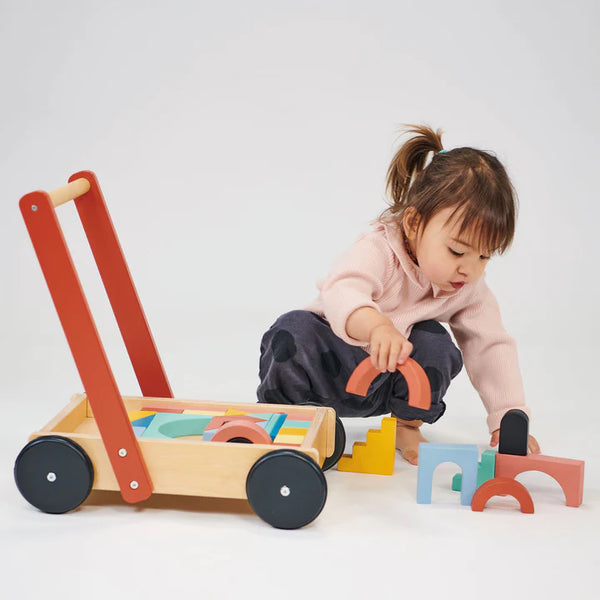How Wooden Toys Help Develop Motor Skills in Toddlers

When it comes to choosing the best toys for your toddler, few options offer as many benefits as wooden toys. These timeless, sustainable toys are not only visually appealing, but they also play a crucial role in helping your little one develop essential motor skills.
From fine motor skills to gross motor coordination, wooden toys provide toddlers with a hands-on way to learn and grow in their formative years.
In this blog, we’ll explore how wooden toys can contribute to motor skill development in toddlers, highlighting specific toy types that promote both fine and gross motor skills.
What Are Motor Skills and Why Are They Important?
Motor skills are the physical skills that allow children to perform tasks and activities. There are two main categories of motor skills:
- Fine Motor Skills: These involve the small muscles in the hands and fingers and are necessary for tasks such as grasping, stacking, and drawing.
- Gross Motor Skills: These involve larger muscle groups and are responsible for movements like walking, running, jumping, and climbing.
Motor skill development is a vital part of a toddler’s growth, as it helps them become more independent and enhances their ability to interact with the world around them. Wooden toys support this development by offering various opportunities for exploration, coordination, and problem-solving.
How Wooden Toys Support Fine Motor Skills Development
Fine motor skills are essential for everyday tasks like writing, buttoning clothes, or using utensils. Wooden toys provide toddlers with an excellent platform to refine these skills in a playful, engaging way.
-
Stacking and Sorting Toys: Wooden stacking toys, like rings or blocks, are perfect for toddlers to practice their hand-eye coordination. By fitting pieces into place, children develop better finger dexterity and spatial awareness. These toys also encourage sorting skills, allowing toddlers to match colors, shapes, and sizes.
-
Building Blocks and Puzzles: Wooden blocks or puzzles require toddlers to use their fingers and hands to manipulate pieces and solve problems. These activities help develop hand strength, coordination, and the precision needed to handle smaller objects.
-
Interactive Wooden Toys: Interactive wooden toys, such as activity boards or learning clocks, provide toddlers with opportunities to use their hands for manipulating knobs, buttons, and gears. These toys encourage finger strength and dexterity as children twist, turn, or slide different pieces.

How Wooden Toys Help Develop Gross Motor Skills
While fine motor skills are crucial for small tasks, gross motor skills are essential for overall physical development. Wooden toys, designed to encourage larger movements, play a key role in fostering these skills.
-
Push and Pull Toys: Wooden push toys or pull-along toys allow toddlers to practice walking, running, and coordination. As toddlers pull their favorite wooden animal or toy behind them, they strengthen their leg muscles, improve their balance, and gain confidence in their movements.
-
Ride-On Toys: Wooden ride-on toys are great for helping toddlers develop balance and coordination. These toys encourage children to use their legs to push themselves along, providing both a fun and active way to develop gross motor skills while also building leg strength.
-
Balance and Coordination: Wooden toys that involve balancing, such as rocking horses, balance boards, or stepping stones, are great for developing a toddler’s coordination and spatial awareness. These toys encourage children to find their balance, improving both their physical stability and fine motor skills. They also help with understanding the concept of balance and support the development of muscles needed for walking and running.
The Benefits of Choosing Wooden Toys for Motor Skill Development
Choosing wooden toys for your toddler not only supports motor skills development but also offers other key benefits:
- Durability: Wooden toys are built to last, meaning they can withstand rough play, allowing toddlers to develop their motor skills over an extended period.
- Sustainability: Wooden toys are often made from eco-friendly materials, making them a sustainable option for parents who are conscious of their environmental impact.
- Sensory Experience: The tactile nature of wooden toys provides a sensory experience that plastic toys cannot replicate. The smooth texture and natural finish of wood stimulate a toddler’s senses and help them develop spatial and tactile awareness.
- Encouraging Independent Play: Many wooden toys are simple yet open-ended, which means toddlers can play independently, fostering problem-solving skills, creativity, and concentration.
Final Thoughts
Wooden toys are more than just nostalgic playthings—they’re essential tools for developing crucial motor skills in toddlers. By engaging with stacking toys, puzzles, ride-on toys, and more, children are not only having fun but also strengthening their fine and gross motor skills in a natural and enjoyable way.
Whether you’re looking to develop hand-eye coordination or encourage physical activity, wooden toys offer a sustainable, safe, and effective way to support your toddler's developmental milestones. So, the next time you’re shopping for toys, choose a wooden toy that will help your child build the motor skills they need to thrive.





